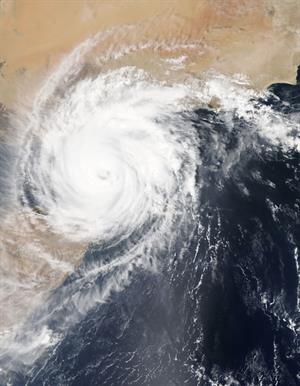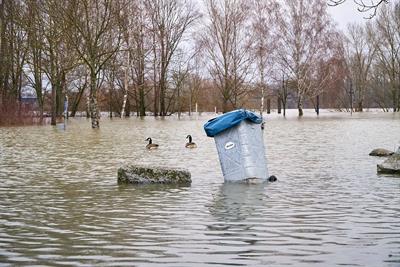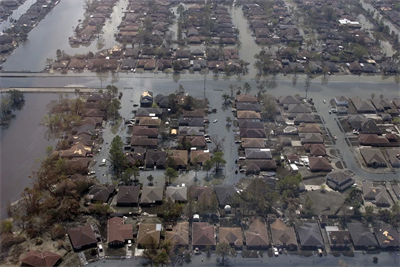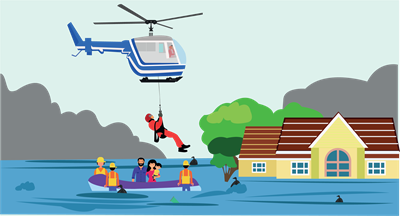PDF chapter test TRY NOW
'Prashant' is the protagonist of the story, "Weathering the Storm in Ersama". The narrative is based on true events about a cyclone that struck Orissa (an Indian state, which is now known as Odisha) on October \(27\), \(1999\), killing thousands of people and damaging hundreds of villages.
In terms of climate, Orissa is in the tropical zone. The climatic conditions are mostly determined by the south-west and north-east monsoons. The state of Orissa is located in a cyclonic area. In the years 1823, 1831, 1932, 1842, 1948, 1874, 1885, 1887, 1890, 1936, 1942, 1967, 1968, 1971, and 1999, cyclones hit Orissa. The Super Cyclone of October 29, 1999, was the most destructive of these.
Balasore, Bhadrak, Cuttack, Dhenkanal, Jagatsinghpur, Jajpur, Keonjhar, Kendrapara, Khurda, Puri, Mayurbhanj, and Nayagarh were among the districts in Odisha that sustained significant damage, with essential services completely disrupted. The Ersama and Kujang blocks in Jagatsinghpur were the most severely hit.
Prashant was born in the town of Ersama in the Indian state of Orissa. Ersama is a large village of 527 households in the Ersama Block in the Jagatsinghapur district of Orissa, and there are above 2000 residents. Following the death of his mother, Prashant left his village seven years ago. He returned to Ersama's block headquarters after seven years to pay his friend a visit. Ersama was a small town in coastal Orissa which was eighteen kilometres from Prashant's village. On that day's evening, a massive storm (Super cyclone) raged. He did not know that that particular night would end up being the worst of his life.
A strong wind and continuous rain devastated the region. Trees were uprooted and crashed upon houses. People and houses were swept away by the force of the flood, causing screams to be heard. There was water up to the neck in Prashant's friend's residence due to the continuous rain.
As Prashant's friend's house was a pucca house, it was able to resist the strong winds, which blew at a speed of 350 kilometres per hour. Still, his friend’s family was scared because in the middle of the night, trees had fallen on the house, damaging the roof and walls of the building.

The Super Cyclone
The 1999 Odisha cyclone was the most powerful and destructive tropical cyclone ever recorded in the North Indian Ocean.
The cyclone was described by the narrator as "crazed destruction" because it was wildly out of control and destroyed lives and property. Though the cyclone's pace had decreased slightly the next morning, it remained in Orissa for approximately one and a half days (nearly \(45\) hours). And, as a result of the heavy rain, the water level continued to rise.
As the water entered the houses, Prashant and his friend's family had taken refuge on the roof. Even though Prashant couldn't see the cyclone's effects in the dark night, he could realise the cyclone's destructive consequences and began to notice the cyclone's devastating impacts in the early hours of the morning.

People on rooftop during flood
As far as Prashant could see, there was a cover of muddy brown water. There were the remains of shattered houses surrounded by the water. Dead bodies of animals and human beings floated in the water. Huge trees had fallen and were floating around. Two coconut trees had fallen on the roof of their house. Initially, they thought that the trees had damaged the roof and walls of the house, but later realised that this proved to be beneficial for them. It turned out to be a blessing in disguise. They ate the tender coconuts off these trees to save themselves from starvation, as they couldn't move from their rooftop.
Prashant and his friend's family stayed on the rooftop for two days because they had no other alternative. To begin with, moving through a flood would be risky, and there was no guarantee that the flood would not worsen. Second, Prashant and his friend's family stayed on the rooftop for nearly two days since they were afraid of infection from the floodwater. It was extremely cold and they had no way to get out from the rain on the rooftop.
Prashant couldn't stop crying since he was terrified for his family's safety during that horrible storm. Prashant's concern grew as the number of people killed by floods increased. Despite the fact that he was in the midst of a potentially dangerous situation, his thoughts were entirely focused on the safety of his family. His dread of losing his family members began to enthral his mind since he had already lost his mother. He was pondering a slew of questions in his head. He feared if his family members would have survived the cyclone's devastation. He never wanted to lose another family member again.
The dreadful rain finally ceased after two days. As Prashant was away from his family for two days during the catastrophe, it seemed like two years to him.
Prashant decided to reach his family as soon as the rain stopped. As leaving at such a dangerous situation (flood) was risky, Prashant's friend's family pleaded with him not to go and to stay with them for a while until everything returned to normal. Prashant, on the other hand, did not want to be there. He wanted to visit and be with his family. His heart longed to see them alive.
Prashant expressed his gratitude to his friend and his friend's family for providing him with a safe haven and taking such wonderful care of him, but he had to depart. He then began his journey back to his village. He resolved to travel to his village by walk, which was eighteen kilometres distant from his friend's house, as there was no other option for travel. He had picked a long, sturdy stick to use in that challenging situation and had begun his journey through the floodwater. There was water all around him, and it was an unforgettable, adventurous journey that he would never forget in his life.
He used the stick as he had to identify the road because it was too challenging for him to notice the road. As there was a possibility of falling into pits in the ground, the stick assisted him in finding shallow places. There was no way of knowing where to step, as everything was fully submerged in water. He couldn't walk fast since the water was waist-deep everywhere. Even when he used the stick, he was not able to walk, as there were times when the water was too high. He had to swim to avoid drowning in it. After a time, he was relieved to be joined by two of his uncle's friends who were also returning to their village. They took a step forward as a team.

Floodwaters that are several feet deep
Prashant and the other two members had witnessed more horrifying scenes as they swam through the floodwater. It was because the dead bodies of humans and animals that died in the floods, including men, women, and children, as well as the carcasses of dogs, goats, and cattle, remained afloat in the river. Prashant and his team had to push the dead bodies of humans and animals away from the water's current.
Prashant's heart grew heavier as he witnessed such terrible scenes, not only because he grieved the deaths of people who had died but also because he was worried about the status of his family members. In every village they passed through, the majority of the houses were submerged in water. It made Prashant cry since he feared his family would not have survived such a catastrophe. He made it to his village of Kalikuda after a long struggle. When he saw the wreckage of his home, he went numb. Their belongings were scattered about in the floodwaters, and some were suspended from tree branches just above the floodwaters. He decided to look for his family at the Red Cross shelter.

Flooded-out houses
The mission of the Red Cross Society is to provide disaster/emergency relief and promote the health and welfare of those in need. It has almost 700 branches across India. In common with other worldwide Red Cross groups, the Society's symbol is a red cross.

Red Cross Symbol
The location of Orissa near the Bay of Bengal makes it vulnerable to the deadly cyclones that periodically sweep up from the south from May to November. As mentioned earlier, over \(10,000\) people died in the cyclone and over a million animals were lost, and \(7\) million people were left homeless.
Prashant arrived at the Red Cross shelter, where he was hoping to see his family. His heart yearned to see them alive. His mother's death had already left him distraught, and he didn't want to lose another member of his family. In the midst of the cyclone survivors, he began looking for members of his family. Firstly, he saw his maternal grandmother. She looked weak but was relieved to see her grandchild alive. She happily stretched her arms, and tears started running down her cheeks. It seemed to be a miracle for her since Prashant's family had assumed Prashant would not survive the storm, just as Prashant had assumed his family would not survive the storm.
The news of Prashant's arrival circulated swiftly among Prashant's family members. Prashant's extended family gathered around him soon and hugged him in relief. He noticed that everyone seemed to be worried, hurt and injured. He met his brother, sister, uncles and aunts. Prashant was greatly relieved to find that his relatives were alive, just as his relatives were relieved to learn that Prashant was still alive.
Though Prashant was relieved that his family members were alive, the awful things he had seen when crossing the road from his friend's house to the shelter, as well as the cries of the crowd within the Red Cross shelter, had a profound impact on him. Despite the fact that his family was saved, he was concerned about those who had died and their relatives who were suffering the loss of loved ones. He was well aware that there were many people who needed help. There is a need for food, clothing, medicine, and other basic needs. His thoughts began to be dominated by the cries of others around him.
The next morning, after reaching the Red Cross shelter, he understood that he needed to overcome his emotions and take charge of the situation. Around 2500 people were accommodated at the Red Cross shelter, who were distraught since they had lost everything in the storm. Also, he came to know that eighty-six individuals had died in his village as a result of the terrible cyclone. The rainstorm washed away nearly all of their village residents. They had spent the past four days at the shelter. They had been eating raw coconuts, but that was insufficient due to the sheer number of individuals. He made the decision to help the needy.
Despite the fact that Prashant was just nineteen years old at the time, he decided to take charge of the 2500-needy people. He gathered a group of villagers, including the elderly and youngsters, to compel the local merchant to give the rice stock to the Red Cross shelter. Perhaps the merchant had not contributed before, but Prashant's group was able to collect rice from him. They even managed to carry food to the entire group by swimming through the floodwaters.
People had been starving for four days without good food in the Red Cross shelter, so they didn't mind eating the rotting rice. People from the entire shelter were able to cook and eat food thanks to Prashant's volunteer group, who had collected rice, grains, and other stuff. They gathered fallen tree branches and used them to light a fire with which to cook the rice.
Prashant then organised a group of young volunteers to help the Red Cross shelter with the cleanup. The team concentrated on cleaning excretory waste, removing corpses, and assisting numerous injured people suffering from their wounds and fractures. The cyclone survivors benefited from Prashant's initiative.
Prashant's volunteer group worked tirelessly to provide food for the cyclone survivors, but it was insufficient because there were 2500 of them. Prashant's team found it difficult to provide them with food on a regular basis. On the fifth day, a military helicopter flew over the Red Cross shelter and dropped some food parcels, which was a relief. Although the mission provided help to cyclone survivors at the time, it was also a failure because the military helicopter did not return. As a result, the crowd's youth began collecting empty utensils, and they made the children lie in the sand with the utensils on their stomachs to signal passing helicopters that they needed food. The helicopters, as expected, received the message and returned with more than just food and supplies for the crowd at the shelter.

Help from Military helicopters
Prashant's focus then shifted to orphan children. He gathered all the kids and set up a polythene tent for them. The ladies at the shelter were tasked with caring for the children, while the men arranged food for everyone.
The effects and impacts of the devastating cyclone remained as it not only damaged properties but took away a lot of lives. Only after a few weeks, did Prashant realise the grievances of women and children. He could sense their pain of loneliness.
He then thought to divert them with some work in order to make them forget their worries. He then introduced them to a food-for-work programme started by an NGO and persuaded them to join it.
The 'Food for Work' programme, now called the "National Rural Employment Programme", was established in the \(1970\)s to help the impoverished. These poverty-relief programmes seek to increase impoverished people's income and employment through creating new assets and creating jobs. Instead of money, this campaign aimed to provide goods.
The role of NGOs was vital in the 1999 Orissa super cyclone. Non-governmental organisations (NGOs) are non-profit, voluntary, and independent organisations that work on a variety of socioeconomic and developmental concerns. During a disaster, the job of non-governmental organisations (NGOs) is to respond quickly and save as many lives as possible with the resources available. The NGOs' key responsibilities were supplying relief materials, creating health camps, participating in rescue operations, and preparing temporary shelters, among other things. The children are also given training and education by the NGO.
Prashant also organised cricket matches for children, which he took part in because he himself liked the sport. Prashant's volunteer organisation assisted widows and children in returning to their normal lives because they did not want to let anyone suffer physically, intellectually, or emotionally.
Initially, the government intended to establish separate facilities for orphans and widows. However, such a proposal was rejected since creating separate institutions for orphaned children and widows would be pointless. They didn't want the orphaned children to grow up without love, and widows to endure social disgrace. Widows in India are generally more vulnerable than men without any financial security or support, and they are supposed to mourn till death.
Prashant's volunteer group planned to place orphaned children and widows in foster families in their own community, where they would receive love and protection.
Prashant continued to offer assistance to people who had been affected by the cyclone. Prashant was able to overcome his grief after six months because he was so engaged with helping others that he forgot about his own anguish. All the widows and orphans looked up to him in their grief, so he learned to grin and break free from his sadness. Prashant is recognised as a rescuer of the bereaved by widows and orphaned children since his unselfish aid has saved many people's lives.
The narrative teaches us not to rely on others for help but to take charge of our own problems and sorrows. Furthermore, the selfless assistance we provide to others will make us feel good and help us overcome our difficulties. Despite the fact that the government and non-governmental organisations aided the storm survivors, Prashant's help was extremely significant and memorable.
